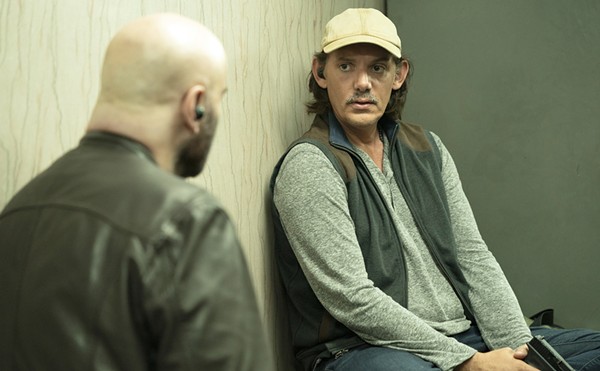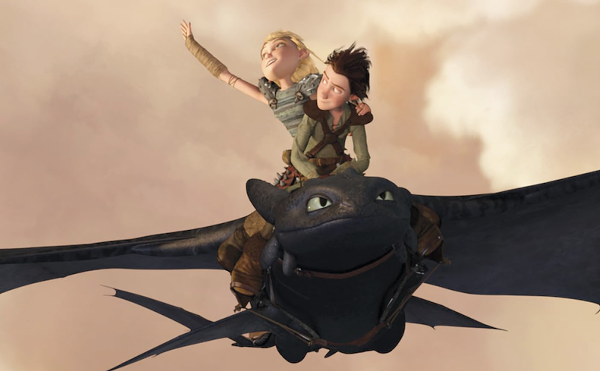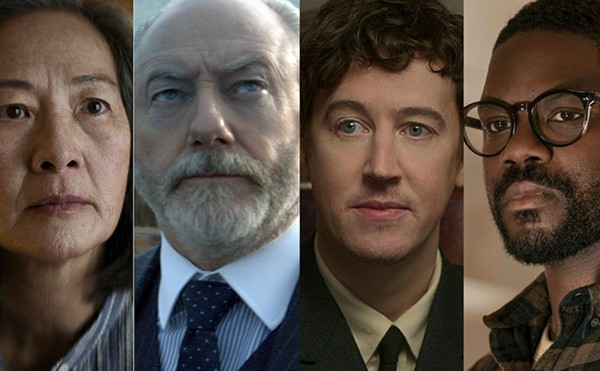| Children of Men Dir. Alfonso Cuarón; writ. Cuarón and Timothy J. Sexton, based on a P. D. James novel; feat. Clive Owen, Claire-Hope Ashitey, Julianne Moore, Chiwetel Ejiofor, Michael Caine (R) |
Why are dystopias, visions of the worst of all possible worlds, so appealing? In King Lear, Edgar provides a cogent explanation: “The worst is not,” he says, “So long as we can say, ‘This is the worst.’” Unhappy the age that finds consolation in a profusion of projected nightmares — novels, including Cormac McCarthy’s The Road, Kazuo Ishiguro’s Never Let Me Go, and Margaret Atwood’s Oryx and Crake, that imagine a future even worse than the present.
Very loosely adapted from a 1992 novel by P. D. James, Children of Men is set in 2027, when children of men — and women — no longer exist because the human race has become infertile. In the opening scene, ubiquitous TV monitors announce the doleful news that the youngest person on the planet, an 18-year-old who was stabbed by a fan, has just died. Humanity itself faces its own extinction, and various characters react to the loss of communal hope with hysteria, numbness, serenity, and resistance. England has deteriorated into a grimy, dismal police state in which masses of desperate refugees — called fugees — are caged and executed. Abducted by the Fish, a guerrilla group dedicated to equal rights for immigrants, Theo (Owen) is recruited to smuggle a black woman named Kee (Ashitey) out of the country and off to the island sanctuary of the Human Project, a shadowy alternative to the dominant culture of death. Kee is, miraculously, in the late stages of
pregnancy.
Children of Men is a visual and visceral quest, a jittery white-knuckle ride through a landscape of terrestrial hell. Many of the set designs seem drawn from images of Auschwitz and Falluja, and one extended take in which Theo and his former wife Julian (Moore) race past a murderous mob of unhinged helots seems drawn from the deepest despair. The grubby streets of London, where explosions are commonplace, have been reduced almost to rubble, and soldiers, immigrants, rebels, and evangelicals compete for air. In a rural redoubt, Theo’s genial friend Jasper (Caine), a mellow, aging hippie, smokes his way to tranquillity. Because of the general decline, director Alfonso Cuarón (Y tu mamá también) does not have to squander his creative energies on devising technology plausible for 2027. Though shabbier, the film’s clothing, cars, and furniture are not much different from what we have today. Beginning with a stark premise, sudden, global infertility, he extrapolates to the chilling practical consequences, while slighting psychological and ethical ones. How much does civilization depend on a faith in continuity? How should one behave when there is no tomorrow? Does chance or purpose govern human history?
In the film, it is never clear how hordes of aliens have made it into an England where travel is severely restricted. Nor do we learn how animals — dogs, sheep, deer — are reproducing when humans cannot. “When the sound of the playgrounds faded, despair set in,” recalls a former midwife who found herself abruptly out of work. Children of Men is not the first time that an unexpected birth is thought to herald universal salvation. Given the desolate state of civilization, this one has to be a beautiful baby.
















